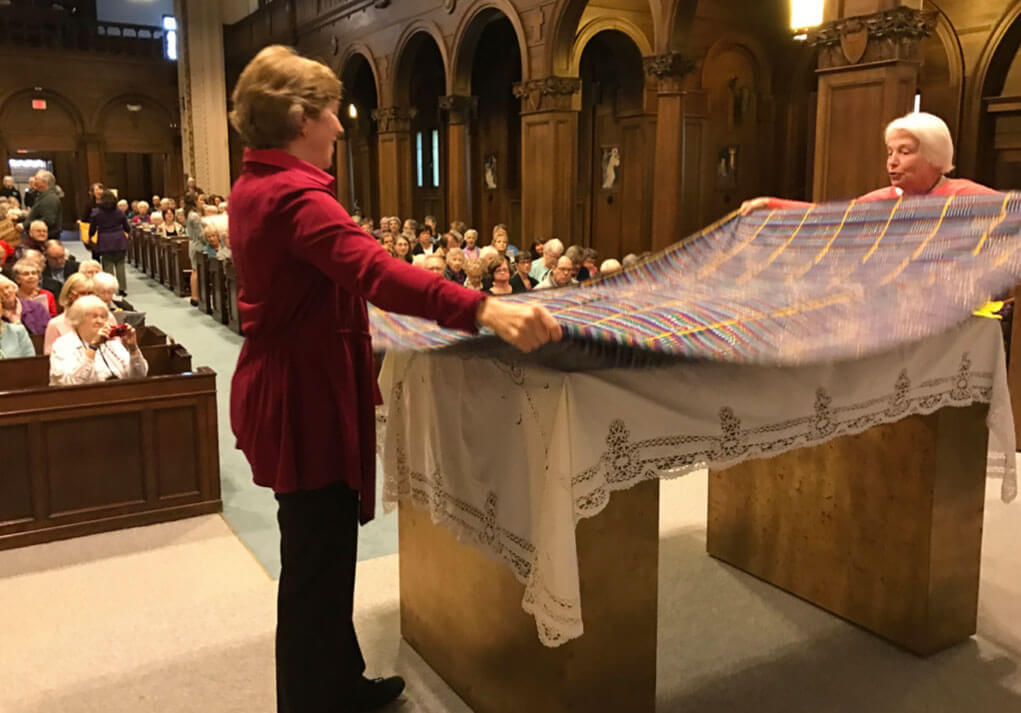
Preaching is what Jesus comes into Galilee to do. His theme is simple and direct. “The time is fulfilled. The kingdom of God is at hand. Repent and believe in the good news” (Make 1.14-15). He spreads the good news of God’s love from village to village very publicly, often in synagogues, often on the Sabbath as he does in Sunday’s gospel.
When Jesus preaches in his hometown Nazareth, his former neighbors experience his astonishing wisdom. But they question in disbelief and perhaps jealousy where a carpenter can have learned such wisdom.
The Church reads gospels about Jesus’ early public ministry on the Sundays between Epiphany and Lent. In these gospels Jesus preaches, heals, and gathers disciples. His fame spreads despite his telling people he heals to tell no one. He makes Capernaum his home base.
By chapter two Jesus is already in conflict with other religious teachers. When he forgives a paralyzed man’s sins, local teachers label his words blasphemy. Only God can forgive sins, they insist (2.1-12). Then Jesus demonstrates his authority to forgive sins by commanding the man to arise and walk.
When local teachers challenge his eating with tax collectors and sinners, Jesus offers this wisdom: “I came not to call the righteous but sinners” (2.17). When they criticize his disciples for picking handfuls of grain on Sabbath, Jesus insists, “The Sabbath is made for people, not people for the Sabbath (2.27).
Even Jesus’ family challenges his emerging ministry as a prophetic preacher and healer. They fear for his safety and sanity and “go out to seize him because people are saying, ‘he is out of his mind’” (Mark 3.21).
Now in the summer the Church returns to proclaiming gospels from Jesus’ early teaching and healing in Galilee. He speaks in parables, for example, comparing the word of God to sowing seed. Like seed, the word of God yields according to the kind of soil on which it falls. Jesus calms a storm and the fears of his disciples. He raises up a child near death. These are far from everyday actions. The gospel wants us to ask: Who can this man be?
- What have you taken away for your life from hearing Mark’s gospel so far this year?
- In what ways do you experience God is near in your everyday life?
In Nazareth Jesus faces a community of disbelief. He can neither heal people of sickness or free them of destructive demons that drive and possess them. His hearers are like the well-worn paths on which no seed can grow (Mark 4.14. What blocks the people’s hearing is certainty and cynicism, which quickly tame their amazement.
The Nazarenes are hearers of Israel’s scriptures, sufferers under Roman rule and taxes, people yearning for the promised messiah. Yet they are certain Jesus is a carpenter and no prophet, no messiah. His prophetic words cannot take root in their hearts.
The gospels of Ordinary Time invite us to take stock of our everyday relationships. We can reverse attitudes that keep us in boxes of certainty. We can recognize what we do to ourselves when we use our creativity to express hate rather than recognize God present in one of our own — a neighbor, brother, sisters, friend.
The holy happens in our lives when we reach out with kindness and interest to those different from us. God is near in how we see and listen, how we share and include.
- What has more power in how you live every day—fear of all you don’t know or certainty you know all you need to know?
- What phrases do you use to invite conversation with a newcomer?
Sunday’s gospel invites us regular churchgoers to see ourselves among the synagogue worshipers in Nazareth and to consider what we are too certain about to rethink.
Jesus invites controversy by speaking his message in public. His words open a door to faith and friendship but demand wrestling with who he is.
Debate and dissent can seem unpatriotic to political leaders and heretical and divisive to church leaders. In Nazareth, certainty leaves no room to believe in Jesus, the possibility of God among us.
- What scares you about controversy and debate?
- What questions have called you to transformation?
Where does authority lie in the hackable world of internet, Facebook, and Twitter? What is true, false, enhanced? What are we willing to believe about people we don’t know or cultures we have never experienced? Why do so many people share memes that express strangers’ extremes and stereotypes. Why don’t we think for ourselves?
What authority do the gospels have today after 2,000 years of work to interpret and live Jesus’ message? Why aren’t we better at loving our enemies or forgiving as we want to be forgiven?
The hometown congregation of my teen years included whole families of gifted musicians. Our priest loved involving the whole parish in liturgy. A decade before Vatican II we were all about “active participation of the faithful.”
We celebrated the Easter Vigil before the rest of the Church. Dad worried we would burn the old wood church down as we lit the fire of creation on the wooden front steps and then the Easter candle to light our way into Church.
When I took money to Father in the sacristy for comic books we also sold after Mass, I discovered that the ornate wedding-cake altar was a hollow catch-all storage place, holy from the front and useful from the rear. When the parish men made a wooden table that faced us, the change made clear what we already lived: we are the body of Christ gathered at his table to worship.
- Why have so many Catholics and other Christians become non-affiliated?
- When have you resisted change to your certainties?
- What in the gospels makes sense to you in today’s world?
